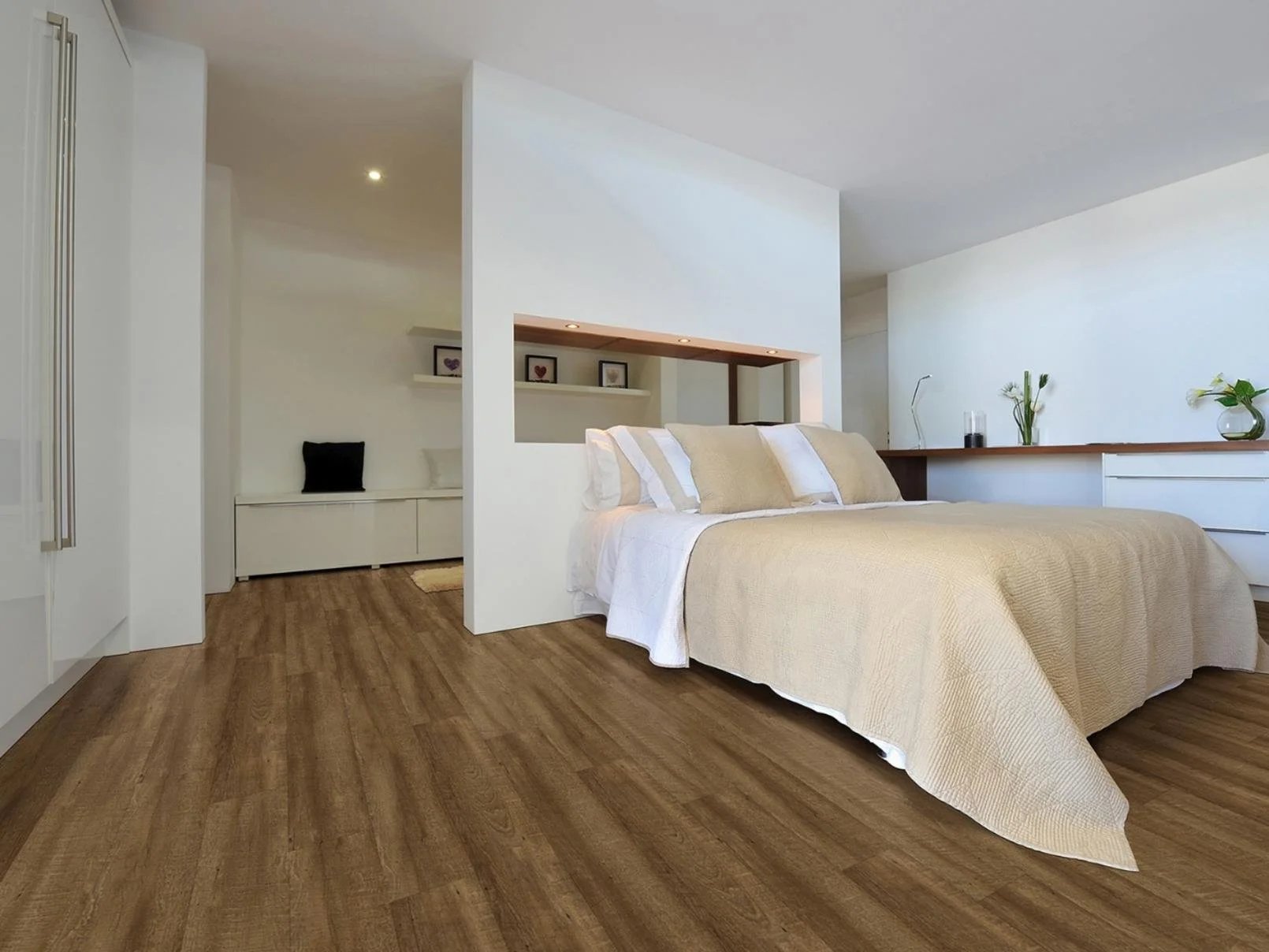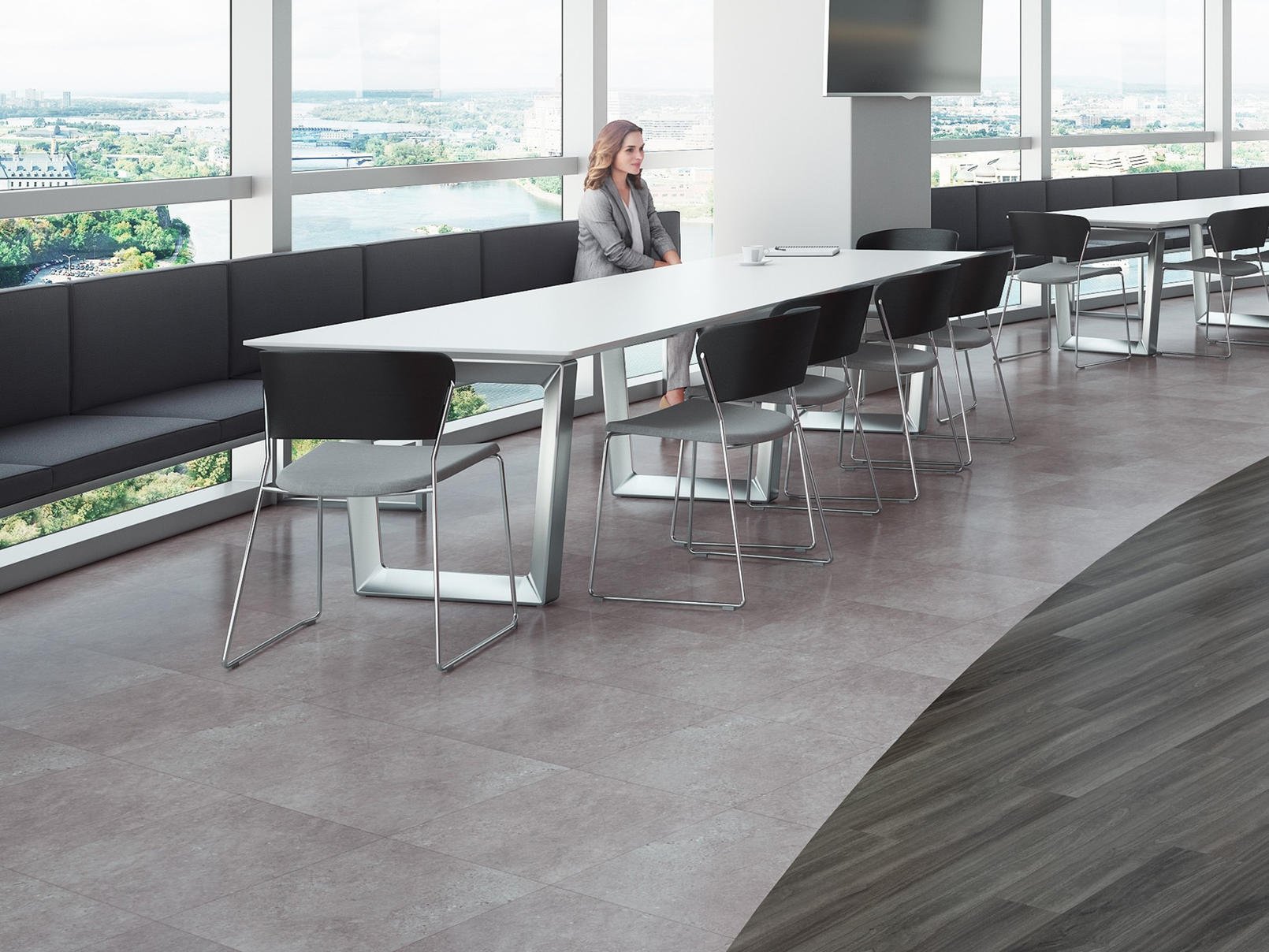FLOORING
VINYL
Imagine transforming your floor with the elegant look and feel of natural materials like wood and stone but without the hefty price tag that comes with them. That is what vinyl flooring offers. It has become a top choice for modern interiors because of its durability, affordability, design options, and water resistance.
What is Vinyl Flooring Made From?
Vinyl floors are made from synthetic materials like plastic, fibreglass and PVC. They have several layers, which are:
Wear Layer: The top layer that protects against scratches and stains.
Print Layer: This layer has a high-resolution image that mimics wood or stone and gives vinyl its realistic look
Core Layer: This layer provides waterproofing and stability, and it can be made of Wood Plastic Composite (WPC) or Stone Plastic Composite (SPC).
Underlayment Layer: This layer offers added cushioning and noise reduction.
Types of Vinyl Flooring
There are two main types of vinyl flooring.
Sheet Vinyl
Sheet vinyl comes in big, continuous rolls that can vary in width and length up to 12 feet wide. It is ideal for covering large areas with minimal seams and is suitable for areas where moisture resistance and easy maintenance are important. Sheet vinyl is available in various designs and colours.
Luxury Vinyl
Luxury vinyl has a thicker construction with about six to eight layers of materials. Unlike sheet vinyl, it comes in multiple planks or tiles about 2mm to 8mm thick, making it durable and long-lasting. It can either be LVT or LVP.
Luxury Vinyl Tiles (LVT): LVT mimics the appearance of stone or ceramic tiles with realistic textures and grout lines. It is available in various sizes and styles and is known for its scratch, stain and moisture resistance.
Luxury Vinyl Planks (LVP): With its long and narrow strips, LVP resembles hardwood planks. It often has realistic wood grain patterns and texture, just like hardwood.
Pros of Vinyl Flooring
Vinyl flooring has many advantages, including:
Affordable: Vinyl is less expensive than natural materials like hardwood or stone.
Durable: Vinyl is highly resistant to scratches, dents, and stains, making it a good choice for high-traffic areas.
Water-Resistant: Vinyl is perfect for moisture-prone areas like kitchens and bathrooms.
Easy to Maintain: Vinyl requires minimal maintenance. Routine sweeping and periodic mopping will keep it looking clean.
Comfortable: Vinyl has a cushioned softer underfoot than tile or wood, which reduces fatigue.
Easy Installation: Many vinyl types come with adhesive backing or a click-lock system, making installation simple.
Cons of Vinyl Flooring
Fading: Extended exposure to direct sunlight may cause vinyl flooring to discolour or fade over time.
Environmental Concerns: Vinyl is produced using PVC, a synthetic material that raises environmental and health concerns because it is not biodegradable.
Damage from Heavy or Sharp Objects: Vinyl can be scratched or dented by sharp objects or heavy furniture without protective pads.
Perception of Value: Some homeowners may perceive vinyl flooring as less luxurious than natural materials like hardwood or stone, potentially impacting the property value.
Maintenance of Vinyl Flooring
Regular Cleaning: Regularly sweep or vacuum to eliminate dirt and debris. Using a damp mop with a mild cleaner will ensure your vinyl floor is spotless.
Protective Pads: Use pads under furniture legs to prevent scratches and indentations on vinyl floors.
Avoid Harsh Chemicals: To prevent damaged surfaces, abrasive cleaners or wax-based products should not be used on vinyl.
Avoid Direct Heat: Keep hot appliances away from vinyl flooring to prevent warping and discolouration.
Think vinyl flooring is right for your space? Connect with our flooring experts today. We’re here to help you create a long-lasting, beautiful vinyl floor that fits your needs and style.





